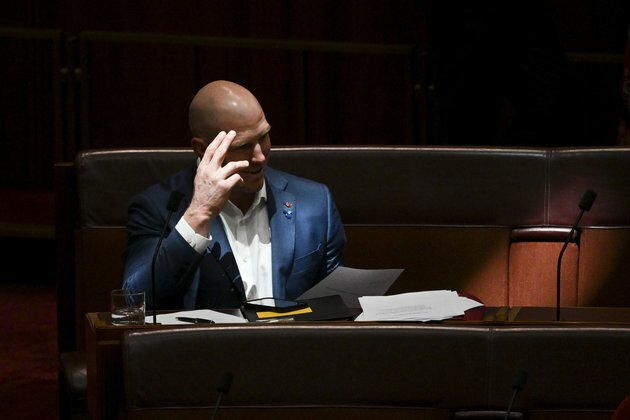What the compromise IR deal means for wage negotiations, and pay rises
The Conversation
01 Dec 2022, 04:08 GMT+10

The Albanese government's Secure Jobs, Better Pay Bill is all set to become law, after Workplace Relations Minister Tony Burke revealed amendments to secure the support of the Greens and ACT independent David Pocock in the Senate.
The government and the trade union movement see the bill as crucial to reinvigorating collective bargaining and lifting wages, especially for lower-paid workers.
Much of the debate has focused on what the bill does with multi-employer agreements - and many of the government's concessions concern that issue.
But if the wage stagnation of the past decade is to be overcome, it will likely be through less-heralded reforms.
Multi-enterprise agreements
While there is much to be said for industry or sector-wide wage agreements, the Fair Work Act does not allow them, and that will not change under the bill. Unrelated employers can choose to make a "multi-enterprise agreement". But they cannot be required to bargain and few such agreements are made.
The bill offers the option of two new types of multi-enterprise agreement: supported bargaining agreements, and single-interest employer agreements. Both will require authorisation from the Fair Work Commission before formal bargaining can commence.
Read more: A mandate for multi-employer bargaining? Without it, wages for the low paid won't rise
Supported bargaining
The supported bargaining system will replace the largely unused provisions for "low-paid bargaining".
It is intended for industries in which (single) enterprise bargaining has proved difficult, such as child care or aged care. The Fair Work Commission must be satisfied it is appropriate for the nominated employers to bargain together, having regard to existing pay and conditions, and any identifiable common interest (for example, being reliant on government funding).
Single-interest bargaining
The single-interest bargaining stream is potentially broader.
It can apply in any sector other than commercial construction (now specifically excluded from all types of multi-enterprise agreement). However, a combination of the original drafting and subsequent concessions will make it difficult for unions to gain a single-interest authorisation.
Unions will not be able to rope in small business employers (to be defined as those with fewer than 20 regular employees) without their consent.
A larger employer can only be included without their consent if a majority of its affected employees want to bargain.
Employers of any size can only participate if they are sufficiently "comparable" to be regarded as having a common interest.
An employer cannot be included if it has a current single-enterprise agreement, or is negotiating a replacement for one that expired in the previous nine months.
No authorisation will be granted unless the Fair Work Commission is satisfied it is in the public interest.
The pathways to agreement
If a union can gain permission to pursue one of the new types of multi-enterprise agreement, it will be able to draw on supports for bargaining that were not there under the current law.
Employers named in a supported bargaining or single-interest authorisation would be obliged to bargain in good faith.
Employees with a bargaining representative could take industrial action - although only if approved in a ballot of represented employees at their workplace.
The Fair Work Commission could assist the parties to reach agreement. In the case of supported bargaining, that might include requiring the involvement of a head contractor or funding body with a "degree of control" over workers' pay and conditions.
Most significantly - and as with prolonged negotiations for a single-enterprise agreement - the commission could resolve an "intractable" bargaining dispute by arbitration. Just the threat of such intervention should improve the chances of gaining agreement.
This, arguably, is the biggest reform to bargaining in the bill.
So when do the wage rises happen?
It will take time to test out the new provisions.
Meeting the onerous requirements for a single-interest authorisation will be difficult, except for employers already bargaining together (such as franchisees or faith-based schools).
If a union can secure majority support at a particular enterprise, it can probably already bargain there.
Any attempt to let existing deals expire and then shift to multi-employer bargaining may be met by public-interest objections - unless the employers concerned also see value in a more collective approach.
Supported bargaining has a greater chance of taking off, especially in low-paid industries where employers may support higher pay if assured of not being at a competitive disadvantage.
Other pathways
The bill offers other routes to higher wages, through "work value" adjustments to award rates, and improved access to equal remuneration orders. That focus on pay equity, also evident in the bill's prohibition of pay secrecy clauses, may prove just as useful in delivering wage rises for feminised sectors.
More generally, the bill seeks to simplify the process of making enterprise agreements and getting them approved.
This includes changes to the "better off overall test", which ensures negotiated pay and conditions are set above the award minimum, not below. (The government has agreed to fix a drafting problem that might have created a loophole for employers to exploit.)
Overall, the Secure Jobs, Better Pay Bill may speed up some bargaining processes and, over time, help reverse the trend away from agreement-making.
But if real wage rises are to return, it will more likely be because governments are prepared to fund them - and employers are willing to trade some of their profits for economic growth.
Author: Andrew Stewart - John Bray Professor of Law, University of Adelaide 
 Share
Share
 Tweet
Tweet
 Share
Share
 Flip
Flip
 Email
Email
Watch latest videos
Subscribe and Follow
Get a daily dose of Zimbabwe Star news through our daily email, its complimentary and keeps you fully up to date with world and business news as well.
News RELEASES
Publish news of your business, community or sports group, personnel appointments, major event and more by submitting a news release to Zimbabwe Star.
More InformationInternational
SectionNew Hampshire federal court ruling defies Trump’s citizenship move
CONCORD, New Hampshire: A federal judge in New Hampshire issued a crucial ruling on July 10 against President Donald Trump's executive...
Houthis attack cargo ship in Red Sea, raising maritime safety fears
DUBAI, U.A.E.: A cargo ship flagged under Liberia, known as the Eternity C, sank in the Red Sea following an attack executed by Yemen's...
Trump administration restarts Ukraine arms deliveries
WASHINGTON, D.C.: The Trump administration has started sending some weapons to Ukraine again, just a week after the Pentagon told officials...
From France’s shores, desperate migrants look to reach British coast
ECAULT BEACH, France: On clear days, the white cliffs of the United Kingdom, are visible from northern France, where men, women, and...
CDC: US records 1,288 measles cases, most since 1992 outbreak
ATLANTA, Georgia: The United States is facing its worst measles outbreak in more than three decades, with 1,288 confirmed cases so...
Gaza War sucking life out of an Israeli generation
In the past month alone, 23 Israeli soldiers have been killed in Gaza—three more than the number of remaining living hostages held...
Africa
SectionOnly four 250+ chases at Lord's: Can India join elite list?
London [UK], July 13 (ANI): As India gears up for a potential big chase at the iconic Lord's Cricket Ground, the historical odds offer...
Sand, dust storms affect 330 million worldwide, cause 7 million premature deaths annually: UN
Geneva [Switzerland], July 13 (ANI): A recent report by the United Nations' World Meteorological Organisation (WMO) has revealed that...
Kiwi batter Devon Conway replaces injured Finn Allen for T20I tri-series against Zimbabwe, South Africa
New Delhi [India], July 13 (ANI): Devon Conway, Mitch Hay, Jimmy Neesham and Tim Robinson set to join the New Zealand T20I squad for...
Marc Marquez fends off Zarco for wet weather pole in Germany
Hohenstein-Ernstthal [Germany], July 13 (ANI): The wet weather has come to play on Saturday at the Liqui Moly Grand Prix of Germany,...
Africa's freshwater ecosystems depend on little creatures like insects and snails: study maps overlooked species
Africa's tropical belt, defined by the Guinean forests of west Africa and the Congo Basin of central Africa, is globally recognised...
Zimbabwe's lithium is in demand for making batteries: how to make sure benefits flow to the local economy
Zimbabwe has the largest lithium reserves on the African continent. Lithium has been mined since the colonial period in the 1950s....













